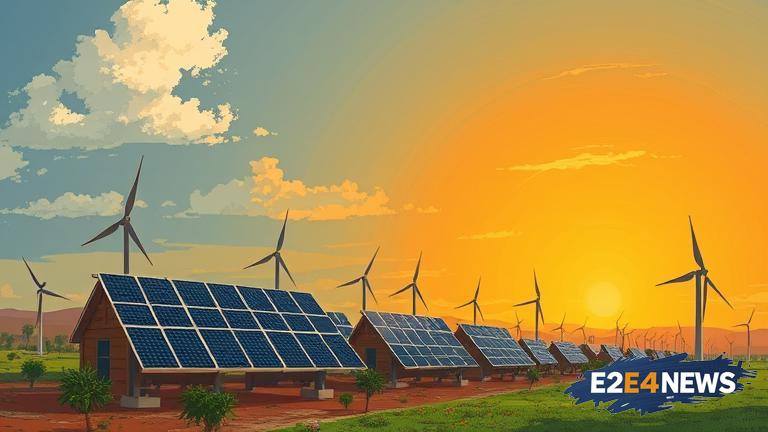Africa is undergoing a significant transformation in its energy landscape, with a growing focus on renewable energy sources such as solar, wind, and hydroelectric power. This shift is driven by the need to reduce dependence on fossil fuels, mitigate climate change, and provide energy access to millions of people across the continent. According to recent reports, Africa has the potential to generate over 1,000 gigawatts of renewable energy, which is more than twice the current total energy demand. The African Union has set a target of achieving 100% renewable energy by 2063, and many countries are making significant strides towards this goal. For example, South Africa has launched a series of renewable energy auctions, which have attracted significant investment and led to the development of several large-scale solar and wind farms. Similarly, Morocco has set a target of generating 52% of its energy from renewable sources by 2030 and has made significant progress in developing its solar and wind energy sectors. Other countries, such as Egypt, Kenya, and Ghana, are also investing heavily in renewable energy and have set ambitious targets for reducing their dependence on fossil fuels. The growth of renewable energy in Africa is not only good for the environment, but it also has the potential to create thousands of new jobs and stimulate local economies. In addition, renewable energy can provide energy access to millions of people who currently lack access to electricity, which is essential for economic development and poverty reduction. The use of renewable energy can also help to reduce energy costs, improve energy security, and enhance energy independence. Furthermore, the development of renewable energy in Africa can help to reduce greenhouse gas emissions and mitigate the impacts of climate change, which are already being felt across the continent. Climate change is having a significant impact on Africa, from droughts and floods to heatwaves and sea-level rise, and reducing greenhouse gas emissions is critical to mitigating these impacts. The African Development Bank has estimated that the cost of climate change in Africa could reach $50 billion by 2050, which highlights the need for urgent action to reduce emissions and transition to renewable energy. The good news is that the cost of renewable energy is decreasing rapidly, making it more competitive with fossil fuels and increasing its attractiveness to investors. In fact, the cost of solar energy has fallen by over 70% in the last decade, making it one of the most cost-effective forms of energy generation. The growth of renewable energy in Africa is also being driven by innovative financing models, such as green bonds and impact investing, which are providing new sources of capital for renewable energy projects. Additionally, the development of renewable energy in Africa is being supported by international organizations, such as the International Renewable Energy Agency (IRENA) and the United Nations Environment Programme (UNEP), which are providing technical assistance and capacity-building programs to support the development of renewable energy. In conclusion, Africa’s renewable energy revolution is gaining momentum, driven by the need to reduce dependence on fossil fuels, mitigate climate change, and provide energy access to millions of people. With the right policies, investments, and international support, Africa can achieve its goal of 100% renewable energy by 2063 and become a leader in the global transition to a low-carbon economy. The benefits of renewable energy are clear, from reducing greenhouse gas emissions and mitigating climate change to creating jobs and stimulating local economies. As the continent continues to grow and develop, it is essential that renewable energy is at the forefront of Africa’s energy strategy. By investing in renewable energy, Africa can ensure a sustainable and prosperous future for generations to come. The future of energy in Africa is renewable, and it is an exciting time for the continent as it embarks on this journey towards a low-carbon economy. With the support of international organizations, governments, and the private sector, Africa can achieve its renewable energy goals and become a model for sustainable development. The time for action is now, and Africa is ready to lead the way in the global transition to renewable energy.
